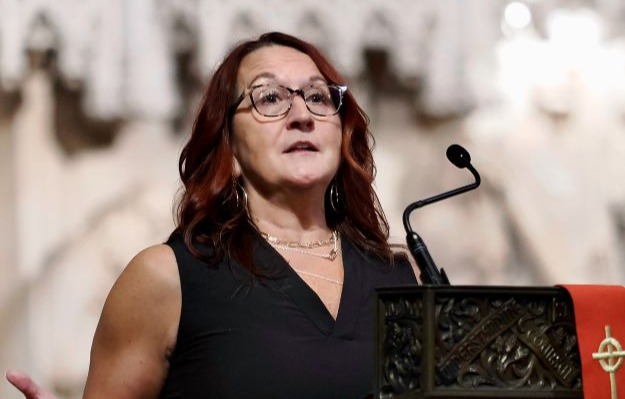Commentary on Genesis 11:1-9
There are a great many “issues” nestled in these few verses: unity/oneness and scattering, the power of language and the gift of hearing/understanding, divine and human boundaries, failure to follow God’s command, and even a critique of empire.1 Any of these could profitably be mined for a worthwhile sermon, but the lectionary pairing of these verses with Acts 2:1–21 guides our focus. While the lectionary relegates this text to an alternative first reading for the Day of Pentecost, it is most helpfully read and reflected upon alongside Acts 2:1–21, illuminating the beautiful interplay among God’s purposes and diversity.
This pairing comes, however, with a great risk of oversimplifying a deceptively complex text, of seeing the Old Testament as always creating a “problem” that the New Testament must resolve, and ultimately then of misreading the blessing of Babel.
Misunderstanding Babel
An all-too-common interpretation of the Tower of Babel story sees it as creating a problem that the Acts 2 story must redeem. What begins at Babel with the whole earth having “one language and the same words” and being “one people” ends in multiple languages, confusion, and scattering. The Spirit at Pentecost then reverses and undoes this, creating a return to a single understood language and restoring the oneness of humanity while the apostles are “all together in one place.” Pentecost becomes the antidote to Babel.
Such a reading, however, is deeply problematic. It fails to recognize that at Pentecost there is no return to an original, single language; rather, everyone hears the gospel “in their own native language” (Acts 2:6, 8). That is the real miracle of Pentecost: how “for one brief moment, we were shown how it is possible to hear one another, regardless of our different languages, cultures, ethnicities, and races.”2
The traditional interpretation also turns diversity into a divinely created punishment. It makes diversity in all its forms something that must be corrected, overcome, undone. It is not difficult to see potential connections with current events in the United States, where diversity, equity, and inclusion (DEI) initiatives are being reversed, called “radical and wasteful,” “illegal and immoral.”3 Interpreters will need to consider whether they (and, more importantly, God) see diversity as a punishment or a gift.
A divine intention for diversity and scattering
At Babel, God creates diversity. It is not a punishment or a problem to be remedied; it is God’s intention for the world stretching all the way back to the very beginning. The first commandment God ever utters in the Bible directed at humanity is to “be fruitful, multiply, and fill the earth” (Genesis 1:28). This command is reiterated after the flood, as Noah and his family disembark from the ark and are tasked with repopulating the world (Genesis 9:1).
At critical junctures in the primeval history, God responds to disobedience with divine scattering. Humanity’s failure in the garden of Eden leads to their expulsion from a singular place into a much wider world (Genesis 3); Cain’s murder of Abel causes him to become a “wanderer on the earth” (Genesis 4:12); and the flood waters spread out to cover “the face of the whole earth” so that even a raven and a dove cannot find dry land (Genesis 8:6–9). At every turn, God’s purposes are tied up with spreading abroad and scattering, in accordance with that initial command to creation. And now at Babel the seeming consequence of unity and oneness in language and intention is scattering and confusing—the very things the people feared most. Their tower-building experiment was an attempt to thwart both prospects.
Yet this scattering need not be seen only as a consequence for disobedience. Walter Brueggemann rightly critiques the either/or mentality of this story, focusing on either the people’s disobedient unity or God’s scattering punishment. Brueggemann helpfully discerns that there are two kinds of unity at work here:
On the one hand, God wills a unity which permits and encourages scattering. The unity willed by God is that all of humankind shall be in covenant with him (9:8–11) and with him only, responding to his purposes, relying on his life-giving power. The scattering God wills is that life should be peopled everywhere by his regents, who are attentive to all parts of creation, working in his image to enhance the whole creation, to bring “each in its kind” to full fruition and productivity. This unity–scattered dialectic does not presume that different families, tongues, lands, and nations are bad or disobedient. They are a part of his will. And the reason God allows for that kind of differential is that all parts of humanity look to and respond to God in unity.4
This wider context of God’s concern with “scattering,” coupled with the unity–scattered dialectic, paints a different picture. Uniformity, homogeneity, sameness, siloing is what humanity desires, but it is not an accurate expression of how God wants humanity to inhabit the world God imagines. The scattering of people and confusion of language is not a curse or a punishment. It is God course-correcting the world to be in alignment with what has always been the divine intention and purpose. Toward that end, at Babel God not only blesses and sanctions diversity—God creates it.
To the ends of the earth
The purpose of God’s people—in Old and New Testament alike—has been not just to be scattered themselves but to scatter and spread the good news of God far and wide. Immediately after Babel and a listing of the “descendants” of Shem and then Terah, we meet Abram, who is sent from his land with a promise that through him and his family the entire world will be blessed (Genesis 12:3). At the conclusion of Matthew, the resurrected Christ instructs his followers to “go and make disciples of all nations” (Matthew 28:19). Acts 1:8 anticipates the sending of the Holy Spirit (Pentecost!), empowering the earliest church to “be my witnesses in Jerusalem, and in all Judea and Samaria, and to the ends of the earth.” And Paul writes in Philippians 2:11 of a time when “every tongue should confess that Jesus Christ is Lord.”
When God’s people, the Church, stays in one place, doesn’t welcome or embrace diversity, tries to define who is in and who is out, who God can love and who God can’t, then we are doing little more than trying to “make a name for ourselves,” rather than extolling and sharing all the beauty that comes with God’s name. We risk making it about ourselves instead of about God and what God has done.
At Pentecost, the Holy Spirit blows open the doors of that single house where all the disciples are gathered as one, sending them out into the world. At Pentecost, the Holy Spirit preserves, affirms, approves, and celebrates the sacred beauty and worth of diversity, birthed at Babel, in all its manifestations and works through it to begin scattering and sharing the good news of Jesus to the ends of the earth.
“The LORD came down”
This seemingly innocuous phrase occurring in Genesis 11:5 is what God must do “to see the city and the tower, which mortals had built.” Often taken as a subtle jab at the unimpressive structure even a unified humanity was able to achieve, in these words we find the very heartbeat of the Christian story. At Babel, God came down to see the tower. In Christ, God came down in human flesh all the way to the point of death on a cross (Philippians 2:5–11; see also John 3:13; 6:33, 38, 41–42, 51; 8:23). At Jesus’ baptism, the Holy Spirit came down and rests upon Jesus, marking him as God’s beloved Son (Matthew 3:16; Mark 1:10; Luke 3:22; John 1:32–33). And at Pentecost, the Holy Spirit comes down so that all hear the gospel in their own languages.
There is not a single story in the Bible where a person is able to make a way to heaven by their own power or effort. Here again we can see a recurring pattern in the primeval history, with humanity’s desire to cross a divine boundary always getting foiled or coming up short: God acknowledges that the first couple’s transgression in Eden has made them “like one of us,” fearing the risk that they might now “take also from the tree of life and eat and live forever” (Genesis 3:22); the sons of God commingle with the daughters of men (Genesis 6:1–5); and the people desire that their tower have “its top in the heavens” and long to make a name for themselves (Genesis 11:4).
Human efforts are destined to fail. There was nothing we could do to make our way “up” to God, so God came down to us. At Babel. At Pentecost. And still in baptism, in the Spirit, in the bread and the wine, and in countless other places. God is a God who comes down—and in doing so, lifts us up from trouble and despair, and ultimately, heavenward (Psalm 3:3; 18:16; 29:2; 30:1; 40:2; Isaiah 40:31; John 14:2–3; Ephesians 2:6; James 4:10; 1 Peter 5:6–7; 1 Thessalonians 4:16–17).
Notes
- For a succinct summary of interpretive possibilities, see Kathleen M. O’Connor, Genesis 1-25A, Smyth & Helwys Bible Commentary (Macon: Smyth & Helwys, 2018), 178–179.
- Miguel A. de la Torre, Genesis, Belief: A Theological Commentary on the Bible (Louisville, WJK, 2011), 136.
- The White House, “Ending Radical and Wasteful Government DEI Programs and Preferencing,” January 20, 2025, https://www.whitehouse.gov/presidential-actions/2025/01/ending-radical-and-wasteful-government-dei-programs-and-preferencing/.
- Walter Brueggemann, Genesis, Interpretation (Atlanta: John Knox, 1982), 99.



June 8, 2025